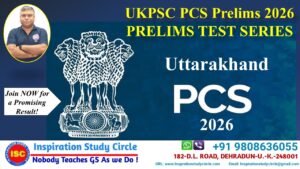
UKPSC- PCS 2026 Prelims Test Series
UKPSC- PCS 2026 Prelims Test Series Table of Contents UKPSC- PCS 2026 Prelims Test Series The Uttar Pradesh Provincial Civil
Inspiration Study Circle, the best IAS/PCS coaching institute in Dehradun, brings you a remarkable career opportunity.
ISC is introducing its UPSC/PCS/CAPF/CDS Foundation Batches for the fresh batch of undergraduates, under the downright guidance of the experienced faculty from ISC, through online, offline, and hybrid teaching patterns.
Graduation years are crucial in one’s educational journey, as they lay the foundation for future academic and professional goals. For students, choosing the apt graduation course can be both exciting and overwhelming. The subjects a student studies here help build a knowledge base and improve thinking and problem-solving skills.
Once the students set their eyes on UPSC Civil Services, there is no holding them back. What further steers, is hand-picking the best possible combination of relevant subjects in itself!
Inspiration Study Circle has a history of yielding distinguished alumni over the past years. And, the inclusion of the foundation course at the graduate level, the exceptionally administered coaching institute for IAS/ PCS/ Defense will establish a well-grounded substructure for a student’s career in Administrative and Civil Services.
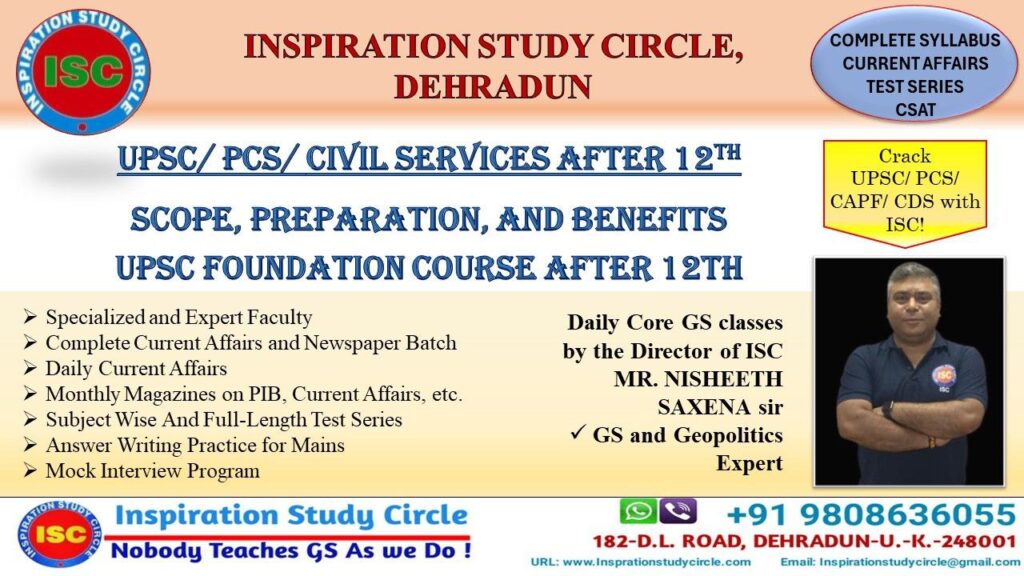
If you are interested in pursuing a career in the Indian Civil Services, including the prestigious Union Public Service Commission (UPSC) examinations, you can start preparing for it after completing your 12th grade. However, it’s important to note that the UPSC exams require a bachelor’s degree as the minimum educational qualification.
Here’s a step-by-step guide on how you can prepare for the UPSC exams after 12th:
It’s important to note that UPSC exams require consistent effort, dedication, and perseverance. It is a long and challenging process that requires a comprehensive understanding of various subjects. Start early, stay focused, and maintain a disciplined study routine to increase your chances of success.
The scope of appearing for the Union Public Service Commission (UPSC) exams after completing your 12th grade is limited because the minimum educational qualification required for the UPSC exams is a bachelor’s degree from a recognized university. However, you can start preparing for the exams during your undergraduate studies.
By appearing for the UPSC exams and successfully clearing them, you can join the prestigious Indian Civil Services, which includes positions like the Indian Administrative Service (IAS), Indian Police Service (IPS), Indian Foreign Service (IFS), and several other Group A and Group B services. These positions offer a wide range of responsibilities and opportunities to serve the nation in various capacities.
Here are some potential benefits and opportunities that come with clearing the UPSC exams:
While the scope of appearing for UPSC exams directly after 12th grade is limited, starting your preparation during your undergraduate studies can give you a head start and a competitive edge. It’s important to complete your bachelor’s degree to be eligible for the exams and to gain the necessary knowledge and skills required for the civil services.
Preparing for the Union Public Service Commission (UPSC) exams, even if you ultimately decide not to pursue a career in civil services, can provide several benefits for aspiring candidates interested in other government jobs. Here are some of the advantages:
It’s important to note that while the UPSC exams have a unique pattern and syllabus, the skills and knowledge gained during the preparation process can be transferrable to other government job exams. Adaptation and customization of the preparation approach may be required based on the specific requirements of the desired government job, but the foundation built through UPSC preparation can be valuable in pursuing a career in the public sector.
“Be willing to be a beginner every single morning.”
Beginning any preparation early has its up-rights. The ‘Boarding with IAS Foundation’ course puts forward the following benefits:
The faculty at ISC, not only ‘teach’ a student the syllabus for UPSC CSE, but also mentor the student in the right direction. The motivation and inspiration inclined by the mentors of ISC boost a candidate’s confidence and morale to another level.
“Get up, get started, get going!”
We provide 100% syllabus coverage with customized modules that save time and provide an efficient study program.
The Inspiration Study Circle, Dehradun, has delivered exceptional results and successful selections every year in the UPSC CSE and State PCS Exams, along with other Central and All India Services Exams, and promises to continue to do so. The UPSC Civil Services Prelims Exam is very hard to crack and only a few dedicated and hard-working ones achieve it. It is possible to make it happen if you decide and dedicate most of your time and efforts to it.
ISC, Dehradun has a good focus on a student-oriented approach and intensive subjects. This is discussed in class and provided to students through various digital media and hard-copy manuals.
The Director of Inspiration Study Circle, Dehradun, Mr. Nisheeth Saxena, is himself a dedicated teacher of the core topics in Static General studies, and an expert in General Studies and Geo-political issues.
Your dream can always become a reality once you start striving for it in your waking state. Your goal should be your priority. Regularity and revision should become your rituals.
Adapt the “Read and Stay Updated” strategy. Best Wishes!
Inspiration Study Circle, Dehradun

UKPSC- PCS 2026 Prelims Test Series Table of Contents UKPSC- PCS 2026 Prelims Test Series The Uttar Pradesh Provincial Civil
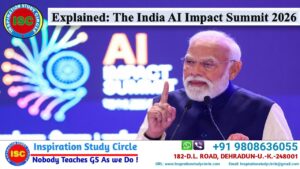
Explained: India AI Impact Summit 2026 Table of Contents India AI Impact Summit 2026 India AI Impact Summit 2026 The India
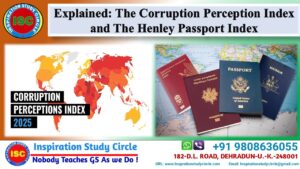
The Corruption Perceptions Index, and The Henley Passport Index Table of Contents The Corruption Perceptions Index, and The Henley Passport

India- USA Interim Trade Agreement (2026) Table of Contents India- USA Interim Trade Agreement (2026) In early February 2026, India and

Explained: India- EU FTA “The Mother of All Deals” Table of Contents India- EU FTA “The Mother of All Deals
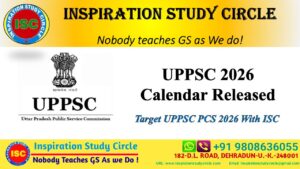
UPPSC- 2026 Calendar Released Table of Contents UPPSC- 2026 Calendar Released Brought to you by Inspiration Study Circle UPPSC- 2026